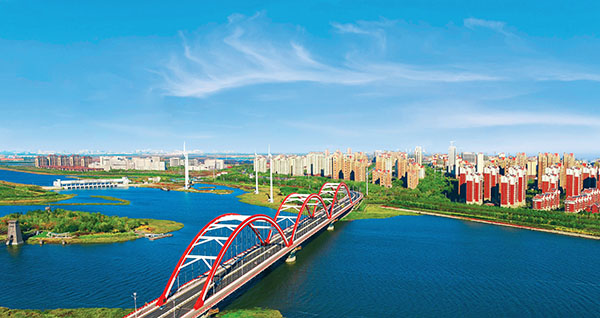Sino-Singapore Tianjin Eco-City
Updated : 2023-06-15
Print Print
Sino-Singapore Tianjin Eco-City is a significant collaborative project between the Chinese and Singaporean governments. It stands as the world's pioneering eco-city developed through intergovernmental cooperation, with construction commencing on September 28, 2008. Spanning a total planned area of 150 square kilometers, the eco-city is home to a permanent population of 130,000.
The eco-city capitalizes on the strategic opportunities presented by the coordinated development of the Beijing-Tianjin-Hebei region. It actively implements a dual-driven development strategy of "Ecology + Smart" to expedite the creation of a livable, business-friendly, enjoyable, and fulfilling ecological city, a smart city, an open city, and a city of happiness.
Considerable emphasis is placed on forging a green and ecological city. It diligently adheres to 100% green building standards and has been approved as a national demonstration base for green architecture and an exemplar city for the application of renewable energy in buildings. It serves as a pilot city for the national "Zero Waste City" initiative, with an impressive 94% participation rate in residential waste sorting and a recycling rate of 70%. The eco-city successfully completed the pilot project for the national "Sponge City" initiative and collaborates with Singapore's National Parks Board to establish a comprehensive garden city. With the development of 38 urban parks, the proportion of regional blue and green spaces exceeds 50%. In 2022, it was officially designated as a national "Practice and Innovation Base for Green Mountains and Clean Waters."
Significant efforts are also dedicated to creating a city driven by technology and intelligence. The eco-city is expeditiously developing leading industries such as intelligent technology services, cultural health tourism, and green building and development. The market boasts over 25,000 entities, and industrial tax revenue accounts for a remarkable 70% of the total. It has been granted national recognition as a cultural export base, a national comprehensive tourism demonstration zone, and the first provincial-level tourism resort in the Beijing-Tianjin region. Additionally, the central fishery port has attained the status of a national backbone cold chain logistics base. As one of the country's pioneering smart city construction pilot cities, it has introduced a smart city index system that meets international standards. Continuously unveiling a range of smart application scenarios centered around "benefiting the people, promoting industries, and good governance," it has become a permanent exhibition base for the World Intelligent Congress and has been acclaimed as a "Typical Area for Smart City" by the Ministry of Industry and Information Technology.
Focusing on Creating an Innovative and Open City. Leveraging the Sino-Singapore cooperation mechanism, the eco-city has successfully secured over 60 national support policies encompassing areas such as financial innovation, urban planning, and construction. It has established a free trade linkage innovation zone and set up a Singapore promotion center, marking the first Southeast Asia cross-border talent service center in northern China. Actively participating in global standardization system development, the eco-city has successfully initiated the formulation of ecological city management standards and implemented the smart city operation guidelines. It has been recognized as a typical case of a globally standardized sustainable development city by the Global Sustainable Development Standardization Alliance.
Dedicated to Building a Vibrant and Happy City. The eco-city has adopted a three-tier residential support model comprising "ecological cells, ecological communities, and ecological zones." It has introduced prestigious educational resources from institutions like Nankai University High School, Beijing Normal University, and Tianjin Foreign Studies University, actively fostering independent education brands, resulting in a student population of 28,000 in schools and kindergartens. Notable establishments include Peking University Binhai Hospital, Tianjin Central Obstetrics and Gynecology Hospital Binhai Branch, and Tianjin University New City Hospital, forming a comprehensive healthcare service system combining general hospitals and specialized departments. Prominent commercial complexes such as Wanda Plaza, Aegean Shopping Park, and Jijing Tiandi Shopping Center have commenced operations. The eco-city has been acclaimed by Xinhua News Agency as " China's most happiness-oriented ecological city."